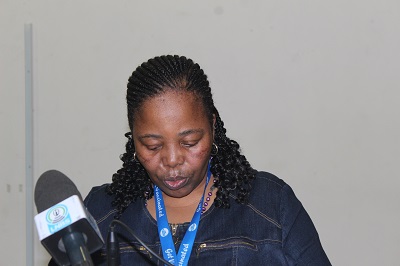By: Thoboloko Ntšonyane
MASERU- While the government of Lesotho through the Ministry of Health (MoH) has made some inroads, there still persists some challenges.
The MoH is continues to engage in the fight against tuberculosis (TB).
The Country TB Program Manager Dr Llang Maama told this publication that, of the estimated TB burden assumes that in 2023 at least 15 000 people will fall with TB in Lesotho, and the system only picked 37% of them.
She said 37% is the treatment coverage, those identified and started on treatment, translating to an upward trend from 32% in 2022 to 37% in 2023.
“The slow decline in TB incidence is concerning, however we know that it will not drop that fast so we need to persevere and continue to intensify implementation of all activities which drive the agenda of reducing burden.
“Treatment coverage remains low for Multidrug Resistant TB (MDR-TB).
Low case detection especially for children and adolescents, and for extra pulmonary TB is another challenge, hence Lesotho has been incorporated among the Centre of Excellence countries in order to improve child and adolescent TB,” she said.
The COE is supported by the International Union against TB and Lung Diseases (Union) and will soon be hosted to develop a curriculum to address this challenge and will be tested in Lesotho. This will reportedly give the country an opportunity to improve knowledge in its health workforce.
The Country TB Program Manager stated that there are still challenges, and chief amongst them is chronic difficulty in finding all patients with TB as projected. This Dr Maama said is attributable to the multi-faceted, where it was established that some patients were being missed simply because they were not being captured into the MoH recording system.
Meanwhile, Dr Maama said an in-depth data review revealed this and onsite training is usually done for those managing the facility data.
She added: “We saw an increase in numbers being notified following this initiative. Some are not coming to seek care in our facilities for different reasons such as lack of cash to travel and pay for services, conversely those who present to our facilities are sometimes missed.
“Strengthened supervision is ongoing however the TB programme would like to go an extra mile and embark on mentorship to make sure that all healthcare workers are comfortable and confident to diagnose and treat TB as well as treating the after effects of it.”
The programme, she said, is developing an Advocacy Strategy for TB so that all TB messaging is standardized and reaches everyone up to the community level.
This, she underscored that it follows a bottom up strategy whereby communities will inform the messaging following the Focus Group Discussions.
She stressed that continuous learning is also critical and an e-curriculum is being developed to ensure sustained capacity building.
The Ministry is also reportedly planning to continue with supporting community and facility based TB screening activities.
The focus will not be limited to the community, but plan for those who are daily seeking care at the facilities in our screening campaigns.
“We shall be more targeted in screening and testing so that our yield is higher than what it is now. The new approach to target the most at-risk population such as People Living with HIV (PLHIV) through Targeted Universal TB Testing (TUTT).More data quality reviews are to be undertaken in order to completely close the data gaps and improve treatment outcomes.
“In order to improve the sensitivity of TB screening, we have added use of digital x-ray in addition to the four symptoms to screening, and with use of Artificial intelligence to interpret x-rays and fast track TB diagnosis especially the sub-clinical TB.”
She stated that they have managed to mobilize more funding through the Global Fund to procure mobile diagnostic van to provide One Stop Services and to meet the people half as many of them are poor and unable to visit Health facilities.
Also, she said mobile back packs, which are mobile digital x-rays to be carried on the back by a person, are being procured in order to further ease access to households which are unable to come to mobile temporary clinics due to distance or sometimes illness.
The expedited diagnosis and treatment she said will be achieved through household visits and screening.
“We shall be strengthened through additional Technical Assistance in order to mentor all the trained health workers on use of guidelines so that we timely diagnose and treat TB, this way we shall improve TB treatment outcomes, quality of life, reduction in mortality and a productive nation.
“We have now started using urine to diagnose TB in patients with advanced HIV and stool for children. It is always difficult to obtain sputum samples from children so use of stool will make it easy and thus help as many children as possible to reach the WHO standard of 5-15% of children with TB,” said Country TB Program Manager.


